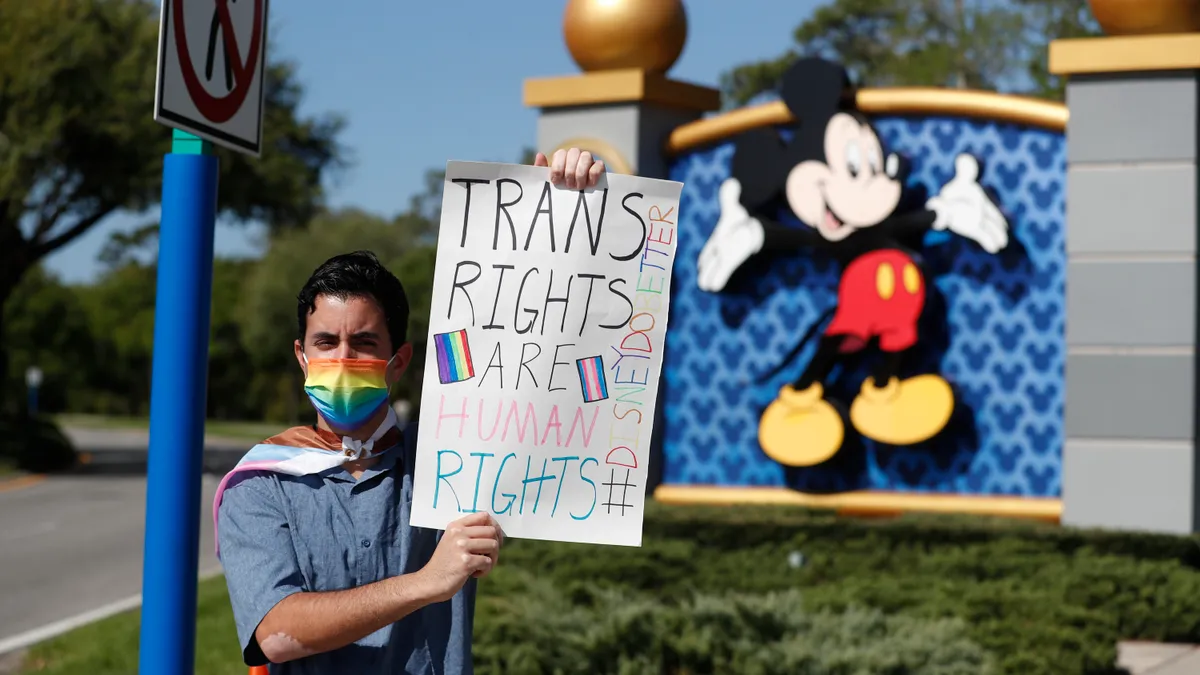UPDATE: March 28, 2022: Gov. Ron DeSantis signed Florida House Bill 1557 into law Monday, March 28. The Walt Disney Co. released a statement via Twitter — this time referring to HB 1557 directly. "Florida's HB 1557, also known as the 'Don't Say Gay' bill, should never have passed and should never have been signed into law," the statement read. "Our goal as a company is for this law to be repealed by the legislature or struck down in the courts, and we remain committed to supporting the national and state organizations working to achieve that."
Following weeks of pressure from employees, The Walt Disney Co. March 22 released a statement seemingly opposing discriminatory Florida legislation. The statement came the same day as an employee walkout protesting a lack of action from the company.
"Disney Parks, Experiences and Products is committed to creating experiences that support family values for every family, and will not stand for discrimination in any form," the statement, posted on Instagram by the official Disney Parks account, read. "We oppose any legislation that infringes on basic human rights, and stand in solidarity and support our LGBTQIA+ Cast, Crew and Imagineers and fans who make their voices heard today and every day."
Disney's statement stopped short of directly referencing the bill that was recently passed in Florida's legislature and is expected to be signed by Gov. Ron DeSantis in the near future.
The controversy swirling around Disney is another example in a growing trend of employees pushing their employers to take a more public stand on political issues that reflect their values.
Florida's House Bill 1557, the "Parental Rights in Education" bill, known informally as the "Don't Say Gay" bill, "prohibits classroom instruction on sexual orientation or gender identity in kindergarten through grade 3 or in a manner that is not age-appropriate or developmentally appropriate for students," according to a summary of the bill's text. The law is expected to take effect July 1.
In an analysis of the bill, New York Times education reporter Dana Goldstein noted that the language is vague and "highly subjective," and by constraining both "instruction" and "classroom discussion" of sexual orientation and gender identity, it could lead to the elimination of books with LGBTQ characters or figures and discourage discussions about families with gay parents, even if it means excluding some students whose parents fall into that category.
The bill also includes a provision that requires schools to inform parents of counseling students are receiving and allow them to opt out of such counseling, which "was written in large part because activists are worried about how schools respond to students who question their gender identity," Goldstein wrote.
While it is headquartered in California, Disney's largest U.S. theme park, Disney World, is located near Orlando — along with an estimated 65,000 to 80,000 of the company's employees.
Disney's relatively slow response stands out in part because many other companies have made or signed statements on the legislation. The Human Rights Campaign and Freedom for All Americans Education Fund organized a business statement on anti-LGBTQ state legislation, which has been signed by 204 companies to date, including Airbnb, Amazon, Target, Hilton and Citigroup.
"These bills would harm our team members and their families, stripping them of opportunities and making them feel unwelcome and at risk in their own communities," the letter reads. "As such, it can be exceedingly difficult for us to recruit the most qualified candidates for jobs in states that pursue such laws, and these measures can place substantial burdens on the families of our employees who already reside in these states. Legislation promoting discrimination directly affects our businesses, whether or not it occurs in the workplace."
In the case of Disney, employees upset by the company's actions have been agitated not only by Disney's decision not to sign the HRC letter — a deliberate one, according to the New York Times — but also by the company's campaign donations to politicians who have supported the bill.
In protest of Disney's actions, a subset of employees participated in a series of walkouts from March 15 through March 22. In its list of demands, walkout organizers included an immediate, indefinite end of political donations to politicians involved in the creation or passage of the Florida bill; a public commitment to an "actionable plan" that "protects employees from hateful legislation;" and "substantial contributions" to human rights advocacy groups, among others.
Disney CEO Bob Chapek reportedly sent employees several missives addressing the issue in an attempt to calm the situation. HR Dive asked Disney to independently confirm the memos, but did not hear back by press time.
In a memo sent March 7 and shared by various media outlets, Chapek noted he met with "a small group of Disney LGBTQ+ leaders" the previous week to hear their concerns. "I want to be crystal clear: I and the entire leadership team unequivocally stand in support of our LGBTQ+ employees, their families, and their communities," he wrote.
"As we have seen time and again, corporate statements do very little to change outcomes or minds," he continued, in explanation of the company's decision not to make a statement. "Instead, they are often weaponized by one side or the other to further divide and inflame. Simply put, they can be counterproductive and undermine more effective ways to achieve change."
Chapek also addressed Disney's political contributions, noting that while the company has "not given money to any politician based on this issue, we have contributed to both Republican and Democrat legislators who have subsequently taken positions on both sides of the legislation," and saying Disney would "reassess" advocacy strategies, including political giving, going forward.
On March 11, in a follow-up memo, he apologized to LGBTQ staff for the company's lack of action and said Disney would be pausing all political contributions.
With the walkout over and no future action yet announced, it's unclear how and if employee activism related to the Florida bill will continue. In his March 7 memo, Chapek promised to address the issue in greater detail at Disney's companywide Reimagine Tomorrow Summit in April.




















